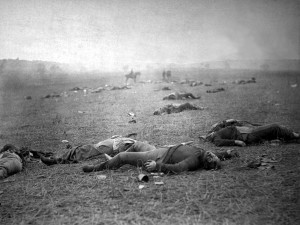What, to the slave, was the Battle of Gettysburg?
Posted July 1st, 2013 by James DeWolf PerryCategory: History Tags: Abraham Lincoln, Battle of Antietam, Battle of Gettysburg, Emancipation, Emancipation to Equality, Fort Wagner, Harriet Tubman, New York City Draft Riots, U.S. Civil War
 What, to the slave and to free blacks, was the Battle of Gettysburg? ((The title and first line of this essay are a paraphrasing of Frederick Douglass’ famous line, “What, to the American slave, is your Fourth of July?”, in his 1852 July 4th address, “The Meaning of July Fourth for the Negro,” in Rochester, N.Y.))
What, to the slave and to free blacks, was the Battle of Gettysburg? ((The title and first line of this essay are a paraphrasing of Frederick Douglass’ famous line, “What, to the American slave, is your Fourth of July?”, in his 1852 July 4th address, “The Meaning of July Fourth for the Negro,” in Rochester, N.Y.))
Today marks the 150th anniversary of the start of the Battle of Gettysburg, which ran from July 1 to 3, 1863.
The Battle of Gettysburg is one of the most well-known events of the Civil War, and its sesquicentennial has been widely anticipated for years. Elsewhere, there are expert military historians to offer the most modern understanding of the battle’s tactical and strategic significance, as well as renowned civil war scholars to interpret the battle’s political and social significance in 1863, and to analyze the public’s memory of the battle in the last century and a half.
At the Tracing Center, we focus on the role of slavery and race in the causes, conduct, and consequences of the Civil War. The Battle of Gettysburg was certainly of strategic importance in determining the outcome of the war, namely, that the Confederacy would be re-incorporated back into the Union, and that emancipation would eventually become a reality throughout the nation. ((Even so, the Battle of Antietam was arguably more significant for the course of the war, and for its role in determining that emancipation would result at the end of the war.))
Beyond the battle’s military significance, though, what does the anniversary of the Battle of Gettysburg tell us about the role of slavery and race in the war, and about the battle’s importance at the time for free and enslaved blacks?


